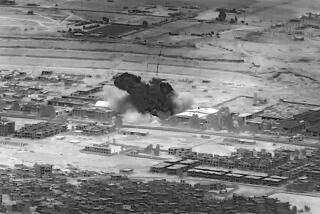U.S. Has Become Easy Scapegoat for Iraqis
- Share via
KARBALA, Iraq — The guard at the mosque of the Mehdi stood vigil Tuesday at the bloody site where, two hours earlier, a suicide bomber had detonated his payload, killing more than a dozen Shiite Muslim worshipers waiting to enter the grounds of the blue-domed house of worship.
“It was the Americans who did this,” said the guard, Abu Yaarub Khafaji, 26. “We saw their helicopters yesterday. They were doing aerial surveillance for the bombings today.”
No matter who the perpetrators are, it seems the U.S. is blamed by Iraqis each time a bomb explodes -- or almost anytime something bad happens.
American-led occupation forces were faulted when a suspected bomb factory exploded last summer on the grounds of a mosque in Fallouja, and they were pointed to as culprits when a car bomb destroyed the police station in Khaldiya in December. They were assailed for providing inadequate security when a blast killed scores of people outside a Shiite shrine in Najaf in August. At the same time, they are regularly excoriated for being heavy-handed at checkpoints and during raids.
It was more of the same in Karbala and Baghdad on Tuesday, the worst day of bloodshed yet in post-Saddam Hussein Iraq.
Passersby even stoned U.S. armored vehicles as they arrived at the stricken mosque in Baghdad’s Kadhimiya neighborhood -- an image beamed around the world.
U.S. officials have gone to great lengths to react gently to the flood of blame coming their way.
“That’s absolutely understandable in a time of grief like that, that people might try to vent their sadness, vent their outrage at persons other than those who actually committed it,” Brig. Gen. Mark Kimmitt, a U.S. military spokesman, said when asked Tuesday about the stoning incident. “I think the passion of the moment probably caused that.”
Still, the reflex to blame the U.S. has clearly bewildered top commanders.
“I don’t know why the people think that,” Lt. Gen. Ricardo Sanchez, the top U.S. military commander in Iraq, said recently about the torrent of accusations directed at the United States after recent bombings in the towns of Hillah and Iskandariya.
“What I do know is that it’s not true, that it’s rumors. And I do know that we have to counter that.... I don’t know how clear I can be that the U.S. and the coalition has no hand whatsoever in conducting attacks against Iraqis and against the police and other Iraqi security forces. It just doesn’t happen.”
Interviews with Iraqis after numerous bombings indicate that what is at issue goes far beyond mere venting. For one thing, this is a fragile society on the mend from a three-decade dictatorship whose brutal security apparatus created an atmosphere of suspicion and paranoia.
The comments also reflect a general disillusionment with the tortuous march toward reconstruction and democracy in Iraq, whether the issue at hand is the continued violence, the lack of electricity, the long lines for gasoline or the joblessness.
Moreover, there is great resentment among Iraqis about the continued foreign occupation of their land.
“Where are all the promises that the Americans made to us?” Karbala resident Mohammed Hussein asked Tuesday as he stood outside a bombing site where five people were killed. “They are drowning in our oil, but they are not protecting us. America must beware of the wrath of the Shiite majority.”
Protecting Iraq’s holy sites is a balancing act. U.S. commanders acknowledge their ultimate responsibility for security in Iraq, but many strive not to be intrusive -- the phrase “cultural sensitivity” is often bandied about in military circles.
From the soldiers’ standpoint, it appears that U.S. forces are vilified whether they take action or stand back -- a point some Iraqis acknowledge has a bit of truth to it.
For instance, Iraqis are repeatedly pressing U.S. forces to turn more responsibility over to Iraqi police and security units. U.S. forces have attempted to comply, withdrawing from much of Baghdad and other cities -- only to be criticized for abdicating responsibility when an attack takes place.
“We have been asking the Americans to keep out of the cities. The Americans got out of the cities at our insistence and request,” Adnan Pachachi, a member of the Iraqi Governing Council, said Tuesday. “And we can’t blame them for not being there.”
More to Read
Sign up for Essential California
The most important California stories and recommendations in your inbox every morning.
You may occasionally receive promotional content from the Los Angeles Times.













